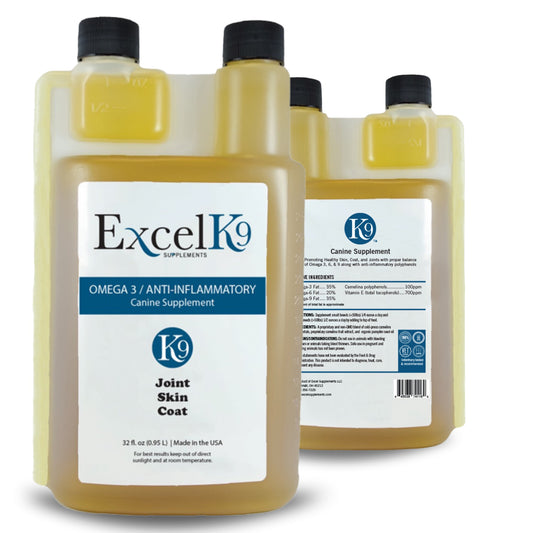Everything You Need To Know About Allergies In Dogs
Share
Managing Allergies in Dogs: How ExcelK9 Can Help
Allergies can disrupt the fun activities you enjoy with your dog, whether it’s a hike, a run in the park, or just lounging at home. Respiratory issues caused by allergies can make it difficult for your dog to breathe, while skin irritations can lead to discomfort and even infection if left untreated.
Understanding Your Dog's Immune System
When your dog encounters an allergen, their immune system goes into overdrive, treating the substance as a threat. Normally, this is a healthy response when fighting off infections or viruses. However, in the case of allergies, this immune response mistakenly attacks healthy tissue, leading to the symptoms we commonly associate with allergic reactions. The more frequently your dog is exposed to the allergen, the more sensitive they become, escalating the severity of future reactions.
The immune system's response involves releasing antibodies like immunoglobulin, which triggers inflammation to fight off the perceived threat. Another key player in allergic reactions is histamine, which also causes inflammation and is responsible for many of the visible symptoms, such as itching, redness, and swelling.
Common Allergens for Dogs
Dogs can be allergic to a variety of substances, with common allergens including:
- Mold
- Pollen
- Dander
- Dust mites
- Dairy
- Proteins from beef, lamb, or chicken
- Eggs
- Soy or wheat gluten
Symptoms of Allergies in Dogs
Allergic reactions in dogs can manifest in different ways, depending on the allergen. Symptoms may include:
- Itchiness
- Hives
- Facial swelling
- Red, inflamed skin
- Sneezing
- Itchy ears
- Chronic ear infections
- Itchy, runny eyes
- Constant licking
- Anaphylaxis (a severe, life-threatening reaction that requires immediate veterinary attention)
Diagnosing Allergies in Dogs
If you suspect your dog has allergies, your veterinarian can help identify the specific allergen. There are two primary methods for allergy testing:
-
Intradermal Skin Testing: This method, performed by a veterinary dermatologist, involves injecting small amounts of allergens under your dog’s skin to observe any reactions. While accurate, it requires sedation and is more invasive.
-
RAST Testing: This simpler blood test can be conducted by your regular veterinarian. A blood sample is analyzed in a lab to detect the presence of specific antibodies associated with allergies. Although easier, it is generally considered less reliable than skin testing.
Treating Dog Allergies
The most effective way to manage your dog’s allergies is to avoid the offending allergens. For food-related allergies, switching to a diet free of the problematic ingredient is usually straightforward. However, avoiding environmental allergens like pollen or dust mites can be challenging. In such cases, your veterinarian may prescribe medications or recommend allergy shots to help build your dog's immunity.
Natural Remedies for Dog Allergies
In addition to veterinary treatments, natural remedies can be highly beneficial in managing your dog's allergies. Omega-3 fatty acids, found in supplements like ExcelK9, play a crucial role in reducing inflammation and supporting a healthy immune response. By including a high-quality omega-3 supplement in your dog’s diet year-round, you can help minimize allergic reactions when they occur.
Bonus Tip: For immediate relief from skin irritations, try using ExcelRescue topically to soothe and heal your dog’s skin.
ExcelK9 is here to help you and your furry friend navigate allergy season with ease, ensuring your dog can enjoy all the adventures life has to offer.




